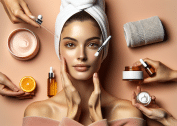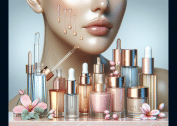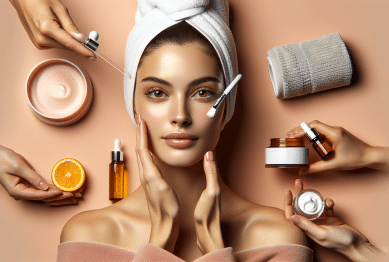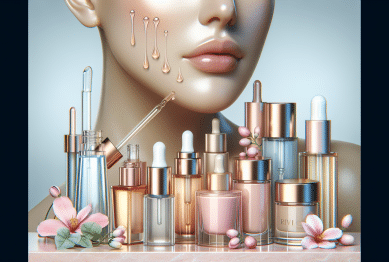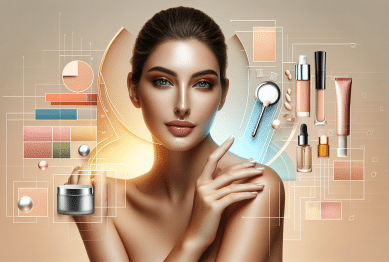Curious if collagen can really help you achieve radiant, younger-looking skin? Uncover what science says about collagen for beauty, its potential skin-supporting effects, various forms available, and how lifestyle can influence your results. Explore how collagen might boost wellness and beauty routines naturally.
The Science Behind Collagen and Beauty
Many people associate collagen with youthful, glowing skin, but few actually understand what it is and how it functions in the body. Collagen is the most abundant protein in the human body, acting like a framework for skin, hair, and nails. Over time, natural collagen production slows, often contributing to the visible signs of aging such as fine lines, wrinkles, and thinning skin. This natural decline makes the topic of collagen for wellness and beauty a source of ongoing curiosity, especially since collagen is not only integral to skin elasticity but also overall structural health.
There are several different types of collagen, each playing a unique role. Type I is the most prevalent in skin and is critical for maintaining a firm, smooth appearance. It’s produced by special cells called fibroblasts and relies on nutrients such as vitamin C for synthesis. As collagen fibers degrade, the skin can lose its youthful bounce. That’s why so many beauty products and dietary supplements highlight collagen as a rejuvenating ingredient: the goal is to support your skin’s natural ability to renew itself from within.
Research continues to explore how supplemental collagen might promote skin elasticity and moisture retention. Some studies suggest hydrolyzed collagen supplements could support dermal density and reduce the appearance of wrinkles, although the results are nuanced. Variables such as age, diet, stress, and environmental exposures all impact collagen breakdown in the dermis. For those addressing changes in their skin, understanding collagen’s multifaceted role brings context to decisions about wellness and beauty rituals. (Source: https://ods.od.nih.gov/factsheets/Collagen-Consumer/)
Supplements, Foods, and Collagen Options
Collagen supplementation has surged in popularity, with powders, capsules, and even drinks available for beauty-conscious consumers. Hydrolyzed collagen, which is broken down for easier absorption, is the most common type found in supplements. Advocates report improved skin smoothness and stronger nails after consistent use, yet outcomes can depend on factors like overall nutrition and dosage. While some enjoy adding collagen peptides to smoothies or oatmeal, it’s important to remember that supplements are not a substitute for a healthy, balanced diet.
Besides supplements, collagen-rich foods could play a role in promoting firmer skin and resilience. Bone broth, chicken skin, fish skin, and egg whites naturally supply collagen and its building blocks. Additionally, foods high in vitamin C — such as oranges, bell peppers, and leafy greens — assist the body in making its own collagen. Ensuring a diet with plenty of plant-based antioxidants can also help protect existing collagen from damage, showing that vibrant wellness and beauty is a whole-body endeavor.
There are topical creams and serums that advertise collagen as a beauty booster, but not all forms are equally effective. Collagen molecules are often too large to penetrate the outermost layer of skin, limiting their direct anti-aging effects. Instead, look for products with peptides or ingredients that support the skin’s own regenerative capacity. Most dermatologists agree that combining dietary support, mindful skincare, and healthy lifestyle choices provides the most well-rounded approach to radiant skin. (Source: https://www.hsph.harvard.edu/nutritionsource/collagen/)
Lifestyle Factors Affecting Collagen Health
It’s not just what you take or eat — how you live day to day leaves a measurable impact on collagen status. Sun exposure accelerates collagen breakdown deep in the dermis, which is why sunscreen is repeatedly recommended for maintaining youthful skin. Chronic stress can also raise cortisol, which is known to degrade connective proteins, including collagen. Simple habits like daily sun protection and stress management can be essential elements in a long-term wellness and beauty strategy.
Sleep quality plays an often-overlooked role in skin regeneration. Deep sleep is when the body goes into repair mode, including rebuilding collagen fibers. Inadequate rest has been correlated with signs of premature aging and reduced skin elasticity. For those interested in everyday steps to boost beauty from within, prioritizing restorative sleep may be just as important as dietary changes or supplements.
Interestingly, lifestyle factors such as tobacco use, high sugar consumption, and excess alcohol can negatively affect collagen. Smoking introduces toxins that weaken collagen and elastin, leading to deepened wrinkles and dullness. Similarly, diets high in sugar contribute to glycation, a process that binds sugar molecules to collagen, making it stiff and brittle. By becoming mindful of these influences, it’s possible to tailor daily routines that nurture healthier, more resilient skin over time. (Source: https://www.ncbi.nlm.nih.gov/pmc/articles/PMC3583892/)
What to Expect: Benefits and Limitations
Many pursue collagen-based products in hopes of visible anti-aging results, but expectations should be realistic. Not all individuals experience dramatic changes, and most benefits are gradual. Some people may notice smoother texture or greater hydration after regular use, but these effects can be subtle and dependent on individual skin types and baseline health. Scientific reviews underline the value of patience and a holistic view when exploring wellness and beauty enhancements centered on collagen.
While emerging evidence suggests that oral collagen supplementation may incrementally improve skin elasticity and hydration in certain populations, these effects are not guaranteed for all. Genetics, hormones, and environmental factors also play important roles. It’s helpful to consider collagen as just one tool in a broader self-care regimen, rather than a miracle solution. Reputable sources emphasize the ongoing need for varied nutrition, daily sunscreen, and gentle skincare as foundational for long-term glow. (Source: https://www.ncbi.nlm.nih.gov/pmc/articles/PMC6835901/)
For those interested in more personalized care, consulting a dermatologist can be insightful. Professionals often provide recommendations tailored to unique skin needs and can help clarify the true impacts of collagen-focused routines. It’s also important to monitor for adverse reactions to new supplements or products, especially for those with allergies or underlying health conditions. Empowered with reliable information, many explore collagen as a gentle, supportive addition to healthy beauty habits — complemented by daily sun protection, moisturizing, and regular check-ins with trusted professionals.
Practical Ways to Support Collagen Daily
Want to build habits that encourage your body’s natural collagen production? Simple steps such as eating more vitamin C-rich foods, staying hydrated, and incorporating protein with each meal can help. People often combine such dietary tweaks with judicious use of hydrolyzed collagen supplements, seeking synergistic results. It’s the combined effect of nutrition, skincare, and daily choices that nurture optimal wellness and beauty outcomes over time.
Daily movement, from strength training to gentle stretching, can also stimulate the circulation needed for skin maintenance and collagen renewal. These lifestyle features not only enhance outward appearance, but contribute to overall vitality. Using broad-spectrum sun protection, especially on the face and neck, guards against key external factors that break down supportive proteins essential for youthful glow.
Optimal collagen health often stems from a pattern of mindful living, rather than reliance on a single ingredient or product. Many create personal rituals combining nourishing foods, supplements, rest, movement, and minimal exposure to harmful substances. As more research emerges, the trend leans toward embracing a holistic approach, one rooted in supporting the body’s inherent abilities to repair, restore, and glow from within. (Source: https://my.clevelandclinic.org/health/body/21961-collagen)
Your Questions About Collagen Answered
The potential for collagen to support radiant skin and beauty raises countless questions. For example, one common curiosity is whether plant-based collagen boosters compare to animal-derived sources. While the body cannot use plant collagen directly, certain antioxidants and amino acid-rich ingredients may help create an optimal environment for the body to make more of its own protein. Considering sources and individual dietary preferences is part of the exploration.
Some people wonder if younger adults should be concerned with collagen supplementation. In most cases, a balanced diet and a strong skincare foundation supply what youthful skin requires. Supplementation might become more compelling with age, elevated stress, or signs of premature aging, but should not overshadow holistic habits. Everyone’s journey is unique, influenced by genetics and daily routines.
Finally, credibility matters when choosing collagen products. Third-party tested supplements, clear ingredient lists, and transparency about sourcing are worth seeking. This way, you can explore the options available with greater confidence, knowing the choices align with overall wellness and beauty goals. When in doubt, gathering information from trusted sources and seeking expert input can fine-tune approaches for your own needs. (Source: https://www.aad.org/public/everyday-care/skin-care-basics/nutrition/collagen-supplement)
References
1. National Institutes of Health. (n.d.). Collagen. Retrieved from https://ods.od.nih.gov/factsheets/Collagen-Consumer/
2. Harvard T.H. Chan School of Public Health. (n.d.). Collagen. Retrieved from https://www.hsph.harvard.edu/nutritionsource/collagen/
3. Shuster, S., Black, M. M., & McVitie, E. (1975). The influence of age and sex on skin thickness, skin collagen and density. Retrieved from https://www.ncbi.nlm.nih.gov/pmc/articles/PMC3583892/
4. Choi, F. D., & Sung, C. T. (2019). Dietary supplementation with hydrolyzed collagen improves skin elasticity and hydration. Retrieved from https://www.ncbi.nlm.nih.gov/pmc/articles/PMC6835901/
5. Cleveland Clinic. (n.d.). Collagen: What it is, types, function & benefits. Retrieved from https://my.clevelandclinic.org/health/body/21961-collagen
6. American Academy of Dermatology Association. (n.d.). Collagen supplements: Do they work? Retrieved from https://www.aad.org/public/everyday-care/skin-care-basics/nutrition/collagen-supplement


